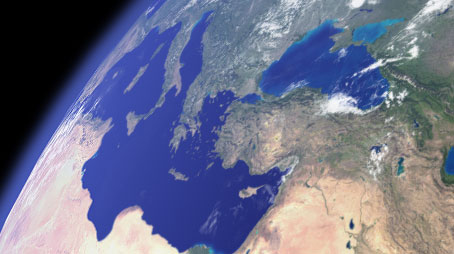

Vision
Updating the IGBP vision
For over 20 years, the International Geosphere‐Biosphere Programme has assembled overwhelming evidence of the unprecedented scale of changes to Earth's most important biological, chemical and physical, processes.
The pace of change has accelerated since the 1950s. A growing population, exponential resource use and rapid industrialisation are responsible for most of the global changes and strongly influence others. The planet´s human population is set to hit nine billion by 2050. The world´s decision makers require information urgently on how the Earth´s social, ecological and physical systems are linked, how they are changing and what sustainable solutions can be applied.
The reason for the urgent need for this new knowledge is threefold : humans are now a prime driver of change on the planet; population growth is set to continue upwards putting increasin g pressure on food, energy and water supplies; and, there is evidence that society is pushing the planet´s climate and other critical physical processes towards thresholds.
If these thresholds are crossed, society risks planetary‐scale and regional‐scale state changes with a potential to cause large‐scale economic and ecological disruptions and unprecedented humanitarian challenges.
In the next ten years, IGBP, working with our partners, will provide the knowledge, expertise and coordination to identify and assess risks posed to society and ecosystems by major changes in the Earth´s biological, chemical and physical cycles and processes, and communicate this to society.
IGBP will seek deeper understanding of the links and feedbacks between Earth-system processes, with a focus on socio‐economic forcings. IGBP will actively promote a new era of inter‐ and trans‐disciplinary research and will work with relevant partners to support solutions to societal transformation.
IGBP will work with international partners and funding agencies to develop research priorities and co‐design projects and initiatives. IGBP will help coordinate and deliver the Earth‐system observation systems required for greater understanding.
IGBP will work to ensure Earth‐system data is stored effectively and that data is freely available.
IGBP’s grand challenges and research questions
The global challenges for the IGBP research community are:
- The planet: increase fundamental knowledge of the Earth system and how it changes.
- The planet under pressure: increase knowledge of how humans affect the Earth system, how the system will respond, and potential consequences for global cycles, ecosystems and people.
- Transformation in an era of rapid global change: provide relevant and timely information to decision makers that will contribute towards sustainable solutions.
Through IGBP’s expertise, coordination and communication, the scientific community has already made substantial progress in many of these areas, particularly on the fundamental research required to understand the Earth system. The new vision provides a step process to allow basic research to flow through to applied research, from science through to policy.
How does planet Earth function as a complex adaptive system?
Priorities
- How are Earth’s ecosystem processes, society and biogeochemical cycles linked, and how will they behave in the future?
- What and where are the boundaries, tipping elements and thresholds in the Earth system?
- How are Earth’s marine, terrestrial, atmospheric and cryospheric systems linked?
- What global observation systems are needed to monitor the natural and socio‐economic systems?
How is human activity affecting Earth’s biogeochemical cycles? And, how are Earth‐system changes affecting society?
Priorities
- What are the critical social‐ecological tipping points and thresholds in the Earth system functioning?
- How do social and ecological systems interact?
- What ecosystems are most at risk?
- What significant environmental changes are likely to result from human actions?
- How will global environmental change affect human well‐being?
- How can society adapt to and mitigate global environmental change?
Transformation in an era of rapid global change
How can new and existing global‐change research findings most effectively inform, catalyse and support appropriate actions at all governance scales, local, national, regional and global?
Priorities
- How can IGBP science be more tailored towards sustainability and poverty eradication?
- What are the plausible scenarios for addressing climate change and more widely, global environmental change?
- How can resources be managed sustainably in an Earth system context? What are the barriers to achieving this?
- What changes would contribute most to improving global sustainability?
- What is the effectiveness of mitigation and adaptation strategies and what are the impacts on social‐ecological systems at local, regional and global scales?
- What are the Earth‐system consequences of the most plausible potential geoengineering schemes?
New vision
IGBP updated its vision in 2010. IGBP undertook this effort to take account of new priorities in Earth system research. In particular, IGBP's sponsor the International Council for Science (ICSU) is developing a new vision for international research. The focus of this new vision is a move towards "global sustainability" research.
